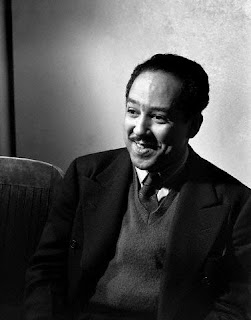Theme for English B
The instructor said,
Go home and write
a page tonight.
And let that page come out of you --
Then, it will be true.
I wonder if it's that simple?
I am twenty-two, colored, born in Winston-Salem.
I went to school there, then Durham, then here
to this college on the hill above Harlem.
I am the only colored student in my class.
The steps from the hill lead down into Harlem,
through a park, then I cross St. Nicholas,
Eighth Avenue, Seventh, and I come to the Y,
the Harlem Branch Y, where I take the elevator
up to my room, sit down, and write this page:
It's not easy to know what is true for you or me
at twenty-two, my age. But I guess I'm what
I feel and see and hear, Harlem, I hear you:
hear you, hear me -- we two -- you, me, talk on this page.
(I hear New York, too.) Me -- who?
Well, I like to eat, sleep, drink, and be in love.
I like to work, read, learn, and understand life.
I like a pipe for a Christmas present,
or records -- Bessie, bop, or Bach.
I guess being colored doesn't make me not like
the same things other folks like who are other races.
So will my page be colored that I write?
Being me, it will not be white.
But it will be
a part of you, instructor.
You are white --
yet a part of me, as I am a part of you.
That's American.
Sometimes perhaps you don't want to be a part of me.
Nor do I often want to be a part of you.
But we are, that's true!
As I learn from you,
I guess you learn from me --
although you're older -- and white --
and somewhat more free.
This is my page for English B.
--Langston Hughes
There is something restrained about Hughes' verse, something guarded, even when he's trying to write in the idiom of jazz or blues or in the voices of Harlem. Here, where he's assuming a persona based on his own experience as a young black man in a white college, he doesn't let go even though the instructor has asked it of him: the anger is muted, ironic. The sense of a powerfully restrained tension born of the necessity of self-concealment haunts every line. It's the voice of someone always doomed to be an outsider, not only a black man in a white world, but also perhaps a closeted gay man, which many think he was. "I like to ... be in love," he writes -- not "I like to love" or "I like to make love," but something more passive: being but not doing.
